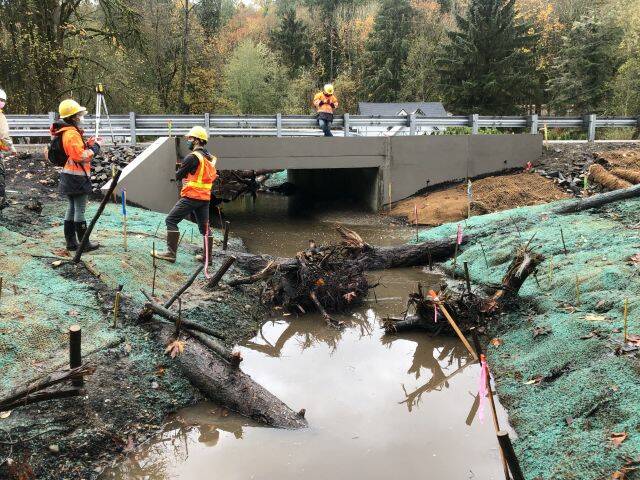State Routes 202 and 203 near Carnation and Fall City could see long traffic delays as soon as next year as the state begins construction on a series of fish culvert replacements.
The project, headed by the Washington State Department of Transportation, is looking to replace four fish culverts underneath SR 202 and 203 that are currently unpassable for trout and salmon populations, including coho, sea-run cutthroat, steelhead and bull.
Culverts are intended to replicate natural stream flows and allow fish to pass under state highways. However, these culverts are too small, steep and shallow for fish to successfully migrate through them.
“Replacing [the culverts] with larger structures increases the likelihood that fish will migrate and spawn successfully,” said Kris Olsen, a spokesperson for WSDOT.
Two of the culvert replacements will happen along SR 202, between Fall City and Snoqualmie. They will reconnect a separated section of Skunk Creek and connect an unnamed tributary to Skunk Creek.
The other two replacements include reconnecting an unnamed tributary to Horseshoe Lake, north of Carnation – Farm Road, and reconnecting an unnamed tributary, just south of Carnation, to the Snoqualmie River
Construction is expected to take a minimum of six months and could begin as early as 2023, but also could start a year or two down the line, according to WSDOT.
WSDOT currently doesn’t have an exact timeline on construction in the Valley because the three-year-long project also includes work on other passages along I-90 and SR 161.
During construction, WSDOT is anticipating single lane closures along SR 202 for up to eight months or a short-term bypass using Fish Hatchery Road. Construction along SR 203 is expected to include a full 56-hour closure, with exceptions to freight, alongside single lane closures.
Olsen said that because they don’t have exact details or a contractor yet, these closures aren’t finalized and fewer lane reductions could be possible.
The work near Fall City and Carnation is less than a tenth of the total cost of the $135 million project. WSDOT will be replacing three culverts along SR 161 near Federal Way and a culvert underneath I-90, just ahead of the I-405/I-90 intersection.
WSDOT, which has jurisdiction over state highways, has made it a priority over the last three decades to improve fish passage and reconnect streams. Since 1991, they’ve removed 365 barriers and restored approximately 1,215 miles of potential habitat.
Efforts were sped up further following a 2013 U.S. District Court injunction, which ordered the state to increase its efforts in removing blocked fish passages and set targets for 2030. That case went all the way to the Supreme Court in 2018, where it was confirmed by a split 4-4 vote.
According to the state’s 2020 “State of the Salmon” report, the Department of Fish and Wildlife estimates there are 20,000 known barriers either partially or fully blocking salmon habitats and spawning grounds. Since 2005, the state has fixed more than 3,000 barriers.
In 2020, WSDOT completed two connection projects to the Snoqualmie River. These include reconnecting the Patterson Creek, in between Redmond and Fall City, and reconnecting Loutsis Creek, near Duvall.


